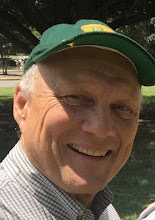Abram gave his nephew the option: Is not the whole land before you? Let’s part company. If you go to the left, I’ll go to the right… (Genesis 13:9). Lot chose the more densely populated, fertile plain while Abram stayed in the mountainous region.
Abram surrendered his rights in order to make peace. This displays the character of Abram including his quiet confidence that God will keep his promises. It is also a model for us in relations with our neighbors. Those who are near to us may be dear to us or troublesome to us or both. Often we do good for all parties when we are willing to stop demanding our rights and let the other person make the choice. This is not always a solution, but it is one worthy of contemplation when conflict arises.
Lot is arrogant and greedy. He chooses the fertile Jordan River valley. And it is fertile indeed. In a dry and thirsty land the banks of the river are precious to all. Lot sees an opportunity to multiply his riches, and he takes advantage of his gracious uncle.
Abram lived in the land of Canaan, while Lot lived among the cities of the plain and pitched his tents near Sodom (Genesis 13:12). These cities in the plain of the Jordan River have a well-deserved reputation. They are uncommonly wicked cities full of rape and murder and ruinous sexual activity.
New Orleans is not Sodom. God could not find 10 righteous people in Sodom. The church of Jesus Christ is alive and thriving in New Orleans with tens of thousands of committed believers. Many obvious differences could be added to this single but very significant distinction between the two cities.
Some cities are plagued with uncommonly high levels of destructive behaviors. We who live in New Orleans wish it were otherwise and are working to change it, but anyone can do the math. Knowing the moral failures of our city, we seek to protect those most vulnerable and at risk, especially the children.
Sometimes well-meaning people target especially wicked places for their witness and Christian work only to fall prey to the very people they were trying to reach. It is dangerous business pitching your tent near Sodom.
The story of the church of Jesus Christ in and around New Orleans includes worldwide ministries that made terrible blunders. This is not unique to our city, but we ought to note it for what it is. Some of the great churches that have been built in the last half century here have suddenly collapsed. Sometimes financial folly has been the culprit. Sometimes sexual sin has crept into the church of Jesus Christ. Pastors who aimed to live holy lives became victims of the aggressive sin around them. Scandals have arisen and been reported in our media on more than one occasion. And mighty men and women of God have fallen and pulled the church into ruin.
Such temptations come to all Christian leaders. My father taught us about Lot when I was a boy. He said that sometimes it is better to be on the mountain with Abram than to be on the plain with Lot. That is, sometimes discretion and prudence demand that we distance ourselves from evil places and people rather than seeking to be involved in changing them. Christian leaders must find their personal place in the tension between being in the world but not of the world, loving the world and not loving the world.
Lot is not deciding himself to be wicked and cruel as he pitches his tent toward Sodom. In fact he will later be characterized as “a righteous man” (2 Peter 2:7). Just because you live in or near a city does not mean that you endorse or participate in its wickedness. In this age of the internet, anyone who lives in any city, or in a rural setting, has easy access to pornography and depravity. Some people revel in the anonymity which the city affords, that people they know are not always looking over their shoulders. They are maskers without masks, taking forays into sin in the delusion that darkness will forever cover their tracks.
Relationships of accountability are of utmost importance for those called to work and witness in the great cities. Families and friendships must be counted dear and held close. Personal devotions should be meticulously maintained. Ethical boundaries should be drawn tighter rather than looser when pitfalls abound.
The cities have always attracted missionaries and pastors. Paul wanted to carry the gospel to Rome. Timothy became pastor in Ephesus, James in Jerusalem. The great cities are moved by our love and our witness, our prophetic word and faithful behavior.
The population of America has moved from majority rural to mostly urban in my lifetime. Most of the people who need our love and witness now live in cities. Put on the full armor of God, take up the sword of the Spirit, and join a team of believers with white-hot passion to reach the cities for Christ.
Wednesday, January 26, 2011
Subscribe to:
Post Comments (Atom)




No comments:
Post a Comment